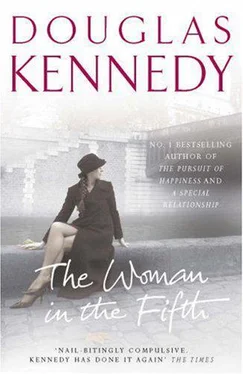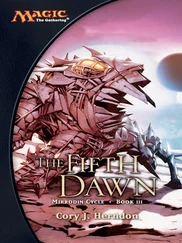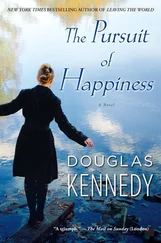‘Whereas the French way is … ?’
‘ Compartmentalize . Accept the Cartesian logic of two separate universes within one life. Accept the contradictory tug between familial responsibility and the illusion of freedom. Accept that — as Dumas said — the chains of marriage are heavy and, as such, they often need to be carried by several people. But never allow the two realms to meet — and never admit anything. Whereas you, Harry, confessed everything … didn’t you?’
‘Yes, I did. And yes, I was a fool to confess.’
‘But you had to share the guilt.’
‘I’d been caught …’
‘Being caught and confessing are two different things.
You know the story of the man who gets caught by his wife in bed with another woman. Immediately he jumps up, naked, and starts yelling, “It’s not me! It’s not me!”’
‘I’m afraid I’ve never had much in the way of “sangfroid”.’
‘No — you just feel uncomfortable about lying. You consider it reprehensible and morally wrong … even though it is the most common — and necessary — of human impulses.’
‘You consider lying necessary ?’
‘Of course. How else do we navigate the absurdities of life without falsehoods? And do you know what the biggest falsehood is? “ I love you .”’
‘Didn’t you love your husband?’
She reached for her pack of cigarettes. I said, ‘You always do that when I ask you something awkward.’
‘You are a very observant man. And yes, I did love my husband … sometimes .’
‘Just sometimes ?’
‘Now please don’t tell me that you can love somebody all the time?’
‘There’s nothing I wouldn’t do for my daughter.’
‘Even though she won’t speak with you now?’
‘Did I tell you that?’
‘Harry, you always sound so shocked when I infer something about your life. But it’s not as if I have psychic powers. It’s just …’
‘My story is so banal and obvious?’
‘All lives are extraordinary. All lives are simultaneously banal and obvious. From what you’ve told me so far, it’s not hard to deduce certain things about you and your situation from a few hints you’ve dropped here and there. But as you don’t want to talk about it …’
‘Any more than you want to talk about what happened to your daughter …’
‘My daughter died.’
‘How?’
‘Do you really want to hear this story?’ she asked.
‘Yes, I do.’
She turned her gaze away from me, focusing her eyes on the window near her bed. After several long drags on her cigarette, she began talking.
‘On June 22, 1980, Zoltan took our daughter Judit — who was just seven — for a walk in the Jardin du Luxembourg. I remember telling him, as he left this apartment, that I was planning to have dinner ready in an hour, and wouldn’t it be easier if they spent time across the road in the Jardin des Plantes. But Judit was very insistent about riding the carousel in the Luxembourg, and Zoltan — who so adored Judit he would give in to anything she asked — told me, “We’ll take a taxi there and back. Anyway, it’s midsummer’s night, so why don’t you come with us? We can splurge and go to a restaurant, and maybe even take Judit to see Fantasia afterward.” But I had already started cooking a spaghetti sauce, and I was rather inflexible back then about changing our domestic schedule once it had been planned for the evening. So I insisted that they come back within an hour, no more. Zoltan told me I was being rigid, “ comme d’habitude “. I lashed back, saying that somebody had to be disciplined around here, in order to keep everything afloat. That’s when he called me a bitch, and Judit got upset and asked why we had to fight all the time, and Zoltan said it was because I needed to control everything, and I told my husband that the only thing that was keeping me in this marriage was our little girl, because he was such a complete waste of time. Judit started to cry, and Zoltan yelled that he was sick of this marriage, and he grabbed Judit and told me that they would eat elsewhere tonight, and as far as he was concerned, I could drown in my fucking spaghetti sauce, and the door slammed behind them, and …’
She fell silent. Then, ‘Hours went by. Three, four, five hours. I figured that, after they had gotten something to eat, they’d gone to the movie. But the cinema was only ten minutes from our apartment by foot. When eleven p.m. arrived, I was worried. By midnight, I was scared. By one a.m., totally panicked — and I started inventing scenarios in my head, telling myself that, in a fit of anger, he’d decided to check them into a hotel for the night … and that he wasn’t letting me know their whereabouts to punish me for being such a bitch. But I knew that Zoltan would never do something so extreme. He mightn’t have had much in the way of ambition, but he still didn’t have a mean streak … something I always loved about him, even thought I was often so stupidly critical about so much to do with him. It’s terrible, isn’t it, how we lash out at the most important people in our lives — often against our better judgment, but just because we are frustrated in our own lives and …’
She broke off again. Another long drag on her cigarette.
‘The police arrived just before two. When I heard the voices on the stairs, I realized immediately that …’
Silence.
‘The police were very quiet, very solicitous. They told me there had been an accident, and would I please accompany them to the Hopital de la Pitie-Salpetriere. I became immediately hysterical and demanded to know what had happened. “ Un accident, madame ,” one of them said, also explaining that they weren’t able to discuss the circumstances of the incident or the condition of my husband and daughter. As the gendarme told me this, his colleague put his hand on my shoulder, as if to steady me. That’s when I knew they were dead.
‘I remember feeling as if I had walked into an empty elevator shaft — a long freefall. My legs buckled, but I somehow managed to make it into the bathroom and empty my stomach in the toilet. At that moment I wanted to stick my head into the vomit-filled water and not pull it out again. Death seemed like the only option. One of the policemen came into the bathroom and stood over me as I was sick. I sensed he knew I might do something selfdestructive — and once, when I dipped my head in the bowl, he gripped my shoulder and said, “You must somehow stay strong.”
‘I finished getting sick. The policeman helped me up. I remember flushing the toilet and going to the sink and filling it with cold water and plunging my head into it and the policeman getting a towel and wrapping it around my head, and shouting something to his colleague, and being helped into my coat and down the stairs, and into the back of their car.
‘At the hospital, they brought me into this small room. We waited almost a quarter of an hour for the “officials” to arrive — but I didn’t care. I knew that the longer “they” stayed away, the longer I wouldn’t have to face …’
She stopped in mid-sentence to light up another cigarette.
‘I must have gone through six cigarettes in that fifteen minutes. Then the door swung open and two men walked in. They were both middle-aged, chubby, grim-faced. One of them wore a white coat, the other a suit. A doctor and a police inspector. The doctor pulled up a chair beside me. The cop hovered by the door, watching me with dark, middle-of-the-night eyes. The doctor forced himself to make eye contact with me. When he started to say, “Madame, I regret to inform you …” I lost the fight I had been waging ever since the police had knocked on my apartment door. I must have cried for at least ten minutes — howling like some wounded animal. The doctor tried to take me by the hands to steady me, but I pushed him away. He offered something to calm me down. I screamed that nothing would deaden the pain. Eventually the doctor started explaining. “ Hit-and-run … killed while crossing a street … they were on a zebra crossing when the driver struck them both … your husband killed instantly, your daughter died just fifteen minutes ago … we tried everything we could to save her, but her neck was broken, her other internal injuries too severe … ”
Читать дальше












